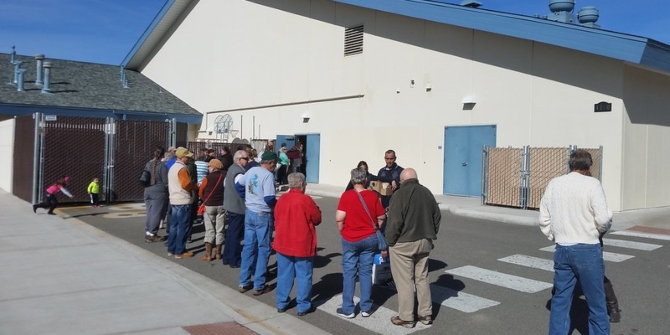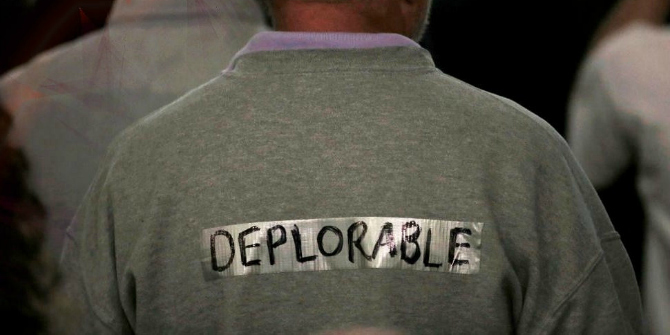 Donald Trump’s mugshot was released earlier this week, following his surrendering at the Fulton County, Georgia courthouse pertaining to his fourth criminal indictment this year. In this Q&A, Thomas Gift discusses the indictments, how Trump is using them to his political advantage, and how they’re shaping the 2024 Republican primaries.
Donald Trump’s mugshot was released earlier this week, following his surrendering at the Fulton County, Georgia courthouse pertaining to his fourth criminal indictment this year. In this Q&A, Thomas Gift discusses the indictments, how Trump is using them to his political advantage, and how they’re shaping the 2024 Republican primaries.
What do you make of this recent flurry of Trump indictments?
This is going to get worse before it gets better. It’s basically corruption clashing with the law and the hyper-polarization of American politics — a combustible mix. It is remarkable how routine this has all become. Nothing about these primaries, or Trump’s court cases, is typical. So it’s unclear how, or if, the standard rules apply. We’re in kind of a bizarre situation where Trump is winning the GOP primaries by infinity points. He’s also facing four criminal indictments. He’s running a campaign essentially outside of a courtroom. All of his rivals look like their candidacies are on life-support. And…it’s only August. I think the only thing we can say is that Trump is in more legal trouble right now than political trouble. He perceives that his best chance to obtain immunity or to avoid a conviction is to be in the White House in a couple of years. So his political and legal strategies are all morphing into one. And when that happens, politics always wins out.
How is Trump trying to frame the indictments politically?
These indictments have almost become a feature, not a bug, of Trump’s campaign. And in many ways, they are his campaign. Trump’s pitch to Republican voters is essentially: a) that I’m the inevitable GOP presidential nominee; and b) that I’m the inevitable nominee because you can’t abandon me when Democrats are weaponizing the judicial system against us. The paradox is this: Criminal charges are Trump’s get-out-of-jail-free card politically. He’s gambling that the donations, and the spikes in poll numbers, keep rolling in. Notice that Trump almost only speaks right now when he’s entering or exiting a courthouse. He’s AWOL from Republican debates. He’s making very few public appearances. But what he is doing is berating the “deep state,” “witch hunts,” “overzealous prosecutors,” and “Trump-hating” judges. So indictment number 4 in Georgia feeds into that playbook.
With so many indictments, what’s the impact on public opinion?
I think the “slow drip” of these indictments has diminishing marginal impact. There’s voter fatigue. Americans have limited capacity for outrage. But remember: that cuts both ways. It doesn’t take much for the MAGA base to activate. But Trump supporters also can’t mount the same immune response every time Trump faces a judge. So there’s not that level of political anaphylaxis with Georgia like with the Alvin Bragg indictment in New York City, for example. With each successive case, maybe the “Trump bump” starts to taper off. Maybe the donations start to plateau. This also raises the point about money: Trump’s Super PAC, Save America, has already run up a tab of about $40 million in legal fees for Trump and his associates. There’s an opportunity cost there. That’s money that can’t be spent on political ads, on-ground mobilization, and so on. That could put downward pressure on Trump’s polling, even if it’s hard to measure.
We finally got to see a Trump mugshot. Will this matter?
The mugshot will go down as the most iconic image of the Trump years. It will mean different things for each side. But politically, it’s hard to overstate what a huge gift this is for Trump. It’s the perfect visual for the same story that Trump’s been telling over and over: that he’s the victim of a partisan vendetta. Trump’s going to spin this into gold. He’s going to get cute it. He already is, posting it on social media and embracing it. Trump’s team discussed what it wanted the shot to look like. Trump’s scowling. So it’s all carefully curated. The photo’s going to be shared, and re-shared, especially among right-wing networks. That’s to say nothing of the fact that the campaign can make all sorts of paraphernalia around it. That’s a massive windfall for Trump’s war chest. Already, the Trump campaign site is selling coffee mugs with the mugshot on them. It’s not exactly a coffee table book about coffee tables, but it’s the next best thing. They’re $25. So if USApp readers need an early Christmas present, they’re available.
The most recent Georgia case covers much the same ground as the DOJ case over the 2020 election. Is one stronger than the other?
One of my concerns about the Georgia case is that it’s everything that the Justice Department case isn’t—and I don’t mean that favorably. Essentially, the DOJ took a very narrow-tailored, almost surgical approach to charging Trump. But the Fulton County indictment is more about throwing the kitchen sink at Trump. We see that with the so-called RICO (Racketeer Influenced and Corrupt Organizations Act) charge, which alleges that Trump breached an anti-organized crime law. The other challenge with the Georgia prosecution is that it hinges a lot on Trump’s own words, especially his statement: “I just want to find 11,780 votes.” I think the way it’s phrased — and this is like everything Trump says — leaves enough ambiguity for lawyers to rationalize. It’s analogous to his language on January 6th, when he said: “You have to show strength and you have to be strong.” But then followed it up with: “go in peace.” That double-talk is classic Trump. It’s wrong. It’s unethical. Everyone knows what it’s code for. But it might be enough for plausible (legal) deniability.
- These remarks are based in part on interviews by Thomas Gift for CNN “Newsroom” on August 25, 2023.
- Image credit: Photo by visuals on Unsplash
- Please read our comments policy before commenting.
- Note: This article gives the views of the author, and not the position of USAPP – American Politics and Policy, nor the London School of Economics.
- Shortened URL for this post: https://bit.ly/3sukM1Q






